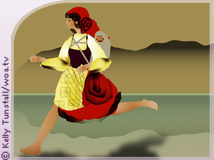

Melpomene is the name of the mythological ancient Greek muse of tragedy. It’s also the name of a mysterious woman who sought to run the marathon in the first modern Olympics, held in 1896. Just as in the ancient Olympics, however, women were not welcome as competitors. But Melpomene ran anyway.
Run Melpomene Run
Though specific details of the incident are lost to the historical record, it is believed that a woman named Melpomene formally applied to participate in the 1896 Games and was turned down by the Olympic Committee. The modern Games’ founder, Pierre de Frédy, aka Baron de Coubertin, was adamantly opposed to women’s participation in sports. Though Melpomene wanted to run in the marathon race, she was not allowed to do so.

Eager to prove that she could tackle the marathon course, Melpomene ran it the day before the actual Games began. She covered the distance from Marathon to Athens in 4.5 hours. A French newspaper of the time reported that Melpomene stopped only once during her run, to suck oranges.
After her successful run, an Athenian newspaper named Akropolis criticized the Olympic Committee in its pages for not allowing Melpomene to participate in the official event. “The Olympic Committee deserves to be reprimanded,” the paper stated, “because it was discourteous in refusing a lady’s nomination. We can assure those concerned that none of the participants would have held any objections.”
Melpomene, a Moniker?
Melpomene’s feat proved that a woman was capable of completing the long-distance race. However, the identity of this important female figure is the subject of some debate. Some scholars believe that “Melpomene” was simply a nickname given to a woman named Stamata Revithi. It could be that sympathetic supporters of the female runner used the moniker because they found it tragic that Melpomene was denied official recognition for her feat. Or the nickname might have come from traditionalists who believed that the female runner’s violation of acceptable female behavior was so deep, it was tragic.
The Olympic historian Dr. Karl Lennartz, however, argues that the historical record shows that two women completed the marathon course in 1896—not just one—although neither was part of the official Olympic Games. He claims that one runner was Melpomene, who ran the course before the official Olympic event, and the other Stamata Revithi, who completed the course a day after the men’s Olympic event.
Lennartz’s account of the 1896 events includes biographical information on this second runner, Stamata Revithi. According to Lennartz, Revithi was a poor woman from the countryside who was carrying her baby on a long journey toward Athens, where she hoped to find a better life. Along the way, she encountered a stranger who asked why she was walking, rather than riding, such a long distance. When she replied that she couldn’t afford to ride, he suggested that she join the upcoming Olympic marathon.
And so Revithi decided to try—hoping that she would draw the notice, and favor, of Greece’s King George I, who was scheduled to formally open the Games. She arrived in Marathon on the eve of the race. The mayor saluted her and journalists asked her if she could win. “I saw in a dream,” she told them, “that I had an apron full of gold and gilded sugared almonds.” Less cryptically, she added, “My heart is in it, I suppose my feet will hold.”
Before she had the chance to run in the official race, Olympic officials decreed that a woman could not compete in the marathon event. Determined to prove that she could do it, Revithi ran the course anyway—the day after the men’s marathon. She finished in 5.5 hours. Sweaty and dusty, she discarded her dilapidated shoes. “You should have seen me while I was running,” she said. “I stopped to watch ships along the way. Otherwise, if I ran straight, I would have reached here in three hours at the most.”
Identity Crisis
It is impossible to say with absolute certainty if one woman named Melpomene was the first female marathon runner to run an Olympic course, or if it was Revithi, or if, as Lennartz holds, there were two women who ran in 1896, both unofficially. Regardless of the uncertainties, the long-term reach of Melpomene’s—and/or Revithi’s—strides was clear by the next Olympiad. This time, women were allowed to enter the Olympics as competitors: The 1900 Games featured 22 women golfers and tennis and croquet players. In 1908, 37 female athletes competed. For 17 of the next 20 Olympics, the number of women climbed. By the Sydney Summer Games in 2000, more than 4,000 women from 199 countries participated in three hundred events. And when the Olympic Summer Games returned to Athens in 2004, 4,412 women competed, representing 41 percent of all athletes. Whether legend or defiant rebel, the spirit of Melpomene lives on in each of them.
Read More About Melpomene





